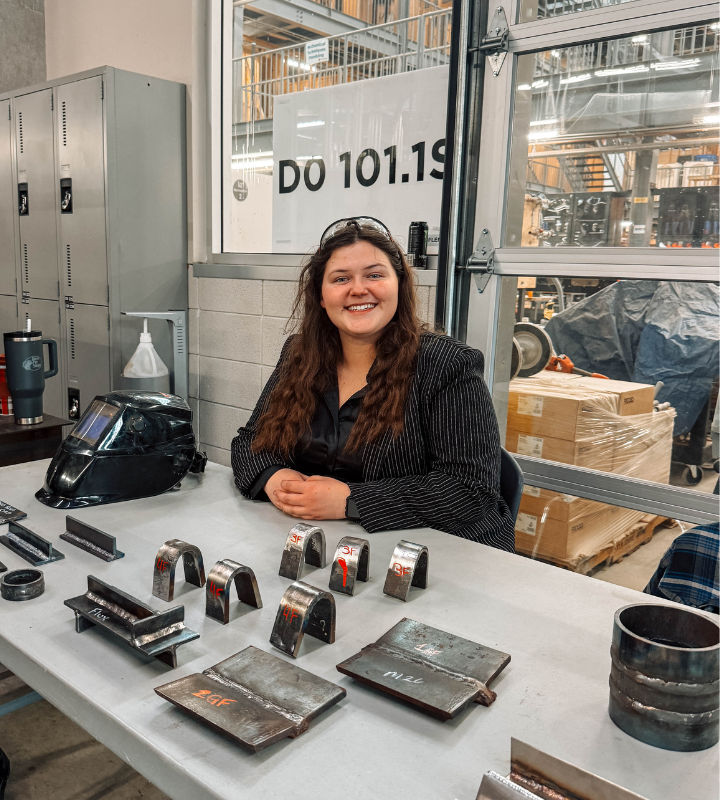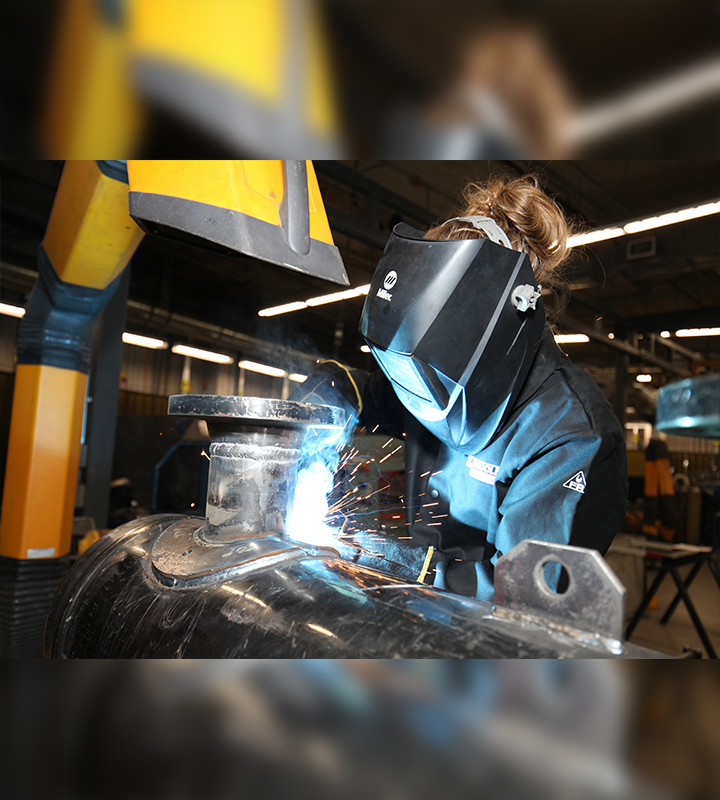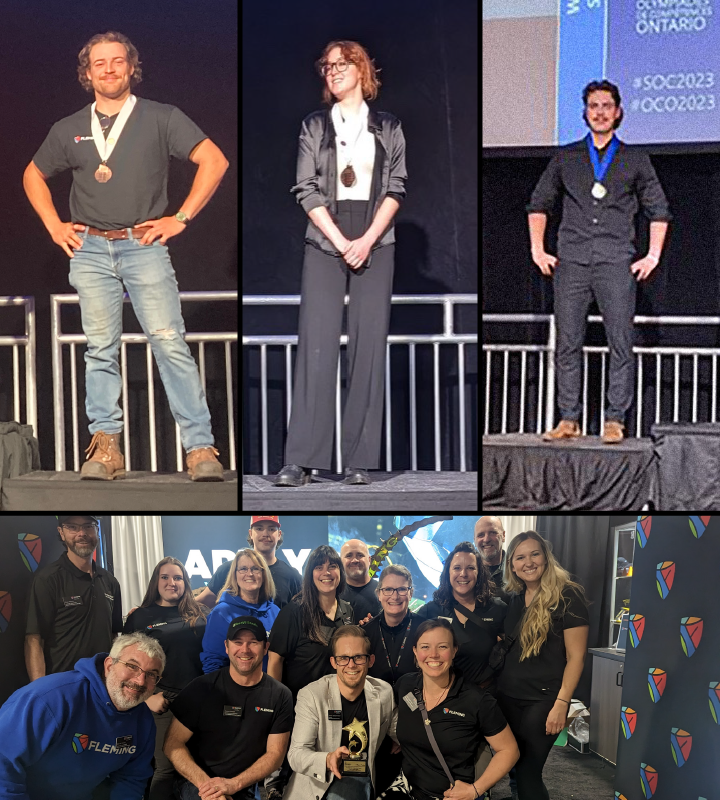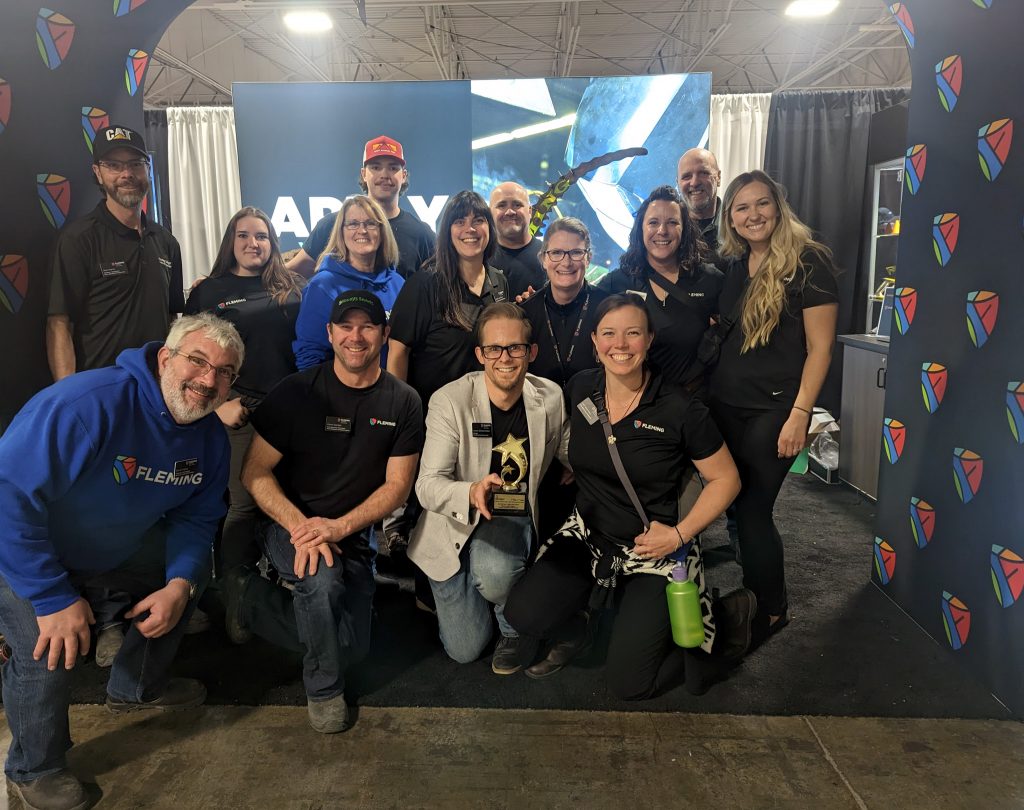Welding and Fabrication Technician
Welders work in numerous industries and across many sectors including in manufacturing foundries, factories, at construction sites and in the aerospace industry.
Program Information
Start Date
September 08, 2026
Domestic Availability
Accepting Applications
International Availability
Closed
CIP Code
48.0508
Program Code
WFT
Delivery
In Person
Credential
Ontario College Diploma
Academic School
Location
Program Contact
Domestic Tuition
per semester*
International Tuition
per semester*
*Domestic tuition amounts shown are from the 2025-2026 academic year and are subject to change.
*International tuition amounts shown are from the 2025-2026 academic year and are subject to change.
Apply Now
Canadian StudentsView Curriculum
Statistics continue to confirm that those getting into this skilled trade now will likely have steady employment for as long as they want to work in the welding and fabricating sector. In this program, you will learn how to:
- Select and apply welding processes and troubleshoot welding equipment
- Use a variety of destructive and non-destructive methods to test welds and acquire advanced skills in fitting and fabrication
- Gain comprehensive theoretical knowledge and have extensive practical hands-on training in welding and metal cutting techniques and all major welding processes
This program provides progressive opportunities to earn Canadian Welding Bureau (CWB) certifications. The program curriculum aligns with having completed Level III of the in-school portion of the Welding Apprenticeship:
- Upon successful completion of the two-semester Welding Techniques Certificate you will have the opportunity to test for the 1GF (Flat fillet and groove welds) and 2GF (horizontal position) certification from CWB
- Once you have successfully completed 2 more semesters in the Welding Fabrication Technician program, you will have the opportunity to test for the 3GF and 4GF (vertical and overhead positions)
The program focuses on a variety of techniques and accompanying theory associated with welding ferrous and non-ferrous metals. Courses include:
- Welding Fundamentals, Welding Processes and Practice
- Applied Blueprint Reading, Layout and Fitting practices
- SMAW (Shield Metal Arc Welding), GTAW (Gas Tungsten Arc Welding), GMAW (Gas Metal Arc Welding)
- Robotic and CNC Operating Skills
- Environmental Issues for Industry
- Skilled Trades Portfolio Development
- Trade Calculations
- Project Management
In addition, you will have an opportunity to obtain industry related health and safety certifications.
The aim of the Welding and Fabrication Technician program is to prepare graduates for entry-level work as a welder, such as welding, brazing and soldering machine operations. With their fitting skills, and knowledge of GMAW, SMAW and GTAW techniques, graduates also have the potential to pursue more highly skilled employment in the welding field. In addition, they will have the added knowledge of sustainable practices.
Employers want applicants who have mastered the techniques of the trade and have experience in various types of welding, such as this program provides. These skills and characteristics will help you succeed in the welding field:
- Very good manual dexterity, the ability to work quickly yet precisely, and good problem-solving skills
- Perseverance, concern for quality and a meticulous approach to the work
- The ability to communicate clearly, read and follow blueprints, and enjoy working with machinery and metals
- Physical strength and endurance, able to bend and work in awkward positions, good vision and hand-eye coordination
Skilled welders should also have: knowledge of metals, relevant product codes, regulations and laws, knowledge of applied mathematics (e.g., fractions, measuring) and geometry, computer skills, the ability to plan and think in steps and three-dimensionally, and a commitment to lifelong learning to keep up with changing technology.
Take a virtual tour of the welding shop.
- Perform work responsibly and safely in compliance with applicable regulations, standards, and sustainable practices.
- Interpret complex engineering drawings, fabrication instructions, and welding symbols to complete advanced welding projects according to specifications.
- Perform safe set-up, operation, and maintenance of thermal and electric arc cutting and gouging equipment.
- Perform a variety of intermediate welding, including pre and post welding operations required in the fabrication of products, structures, templates, and patterns.
- Use basic destructive and non-destructive testing methods to determine the difference between defects, discontinuities and how they relate to overall weld quality.
- Create drawings, templates, and patterns for the fabrication of complex welding projects.
- Troubleshoot mechanical problems and implement the equipment repair.
- Use project management skills and processes to successfully complete an applied welding project.
Students applying to Welding and Fabrication Technician must meet the following requirements:
- OSSD with Gr 12 C English and Gr 12 C Math*
*Minimum final grade of 55% required in Gr 12 C Math.
Recommended (but not required for admission)
- Ability to lift 18 kg (40 lbs) and to dismantle and assemble large pieces of equipment
- Capacity to work with small and delicate instruments
- A high degree of fine and gross motor control
PC / Windows
- Operating System:Windows 10
- Processor:Core i5 - 1.6Ghz minimum
- Memory:8GB minimum
- Hard Disk:160GB minimum
Internet Connection: 2.5 Mbps Download and 3.0 Mbps Upload (minimum)
Transfer Agreements
You may be able to use credits obtained at Fleming College to continue your postsecondary education in pursuit of a degree. The articulation and credit transfer agreements with our partner institutions are summarized here.
Bachelor of Arts in Educational Studies and Digital Technology
Requirement
- Minimum mid-70% cumulative program average.
Transfer Credit
- 60 out of a 120-credit degree.
- Refer to ONTransfer.ca for further details.
To apply please see the Ontario Universities' Application Centre (OUAC) website.
For more information
Visit the Ontario Tech University website for further articulation and program information.
Visit the ONTransfer.ca website for agreement information.
Bachelor of Arts in Psychology
Requirement
- Minimum mid-70% cumulative program average.
Transfer Credit
- 60 out of a 120-credit degree.
- Refer to Ontario Tech's website for further details.
To apply please see the Ontario Universities' Application Centre (OUAC) website.
For more information
Visit the Ontario Tech University website for further articulation and program information.
Bachelor of Commerce
Requirement
- Minimum mid-70% cumulative program average.
- Completion of the Ontario Tech Commerce Bridge.
Transfer Credit
- 45 out of a 120-credit degree.
- Refer to ONTransfer.ca for further details.
To apply please see the Ontario Universities' Application Centre (OUAC) website.
For more information
Visit the Ontario Tech University website for further articulation and program information.
Visit the ONTransfer.ca website for agreement information.
Bachelor of Interdisciplinary Studies
Requirement
- Minimum 65% cumulative program average.
Transfer Credit
- Entry into 5th semester standing in an 8-semester program.
- Refer to Seneca College's website for further details.
To apply please see the Ontario Colleges website.
For more information
Visit the Seneca Polytechnic website for further articulation and program information.
Visit the ONTransfer.ca website for agreement information.
See the official articulation agreement.
In The News: Welding and Fabrication Technician

Fleming College’s Welding Industry Showcase recently brought students, industry professionals, faculty, and community members together for an exciting day of in-person project and portfolio presentations, and networking opportunities. The showcase, held at the Kawartha Trades and Technology Centre (KTTC), celebrated skill, creativity, and the future of welding in Ontario and beyond.
Students showcased their work, from intricate metal art to advanced fabrication projects, demonstrating the technical skills taught in class and combining them with creativity through hands-on learning.
Our fourth semester Welding and Fabrication Technician students had the chance to present their culminating projects that simulated a real-world fabrication scenario where they had to apply a wide range of skills under industry standards.
The project involved the fabrication and welding of a pressure vessel, which is a container designed to hold gases or liquids under pressure. These are used in industries like oil and gas, chemical processing, and food manufacturing. Key components of the project include interpreting technical drawings, selecting appropriate materials, and beveling for full-penetration welds. Students apply processes like SMAW (Shield Metal Arc Welding), GTAW (Gas Tungsten Arc Welding), and GMAW (Gas Metal Arc Welding) while executing multiple weld passes and maintaining quality, cleanliness, and temperature control.
Upon completion, projects are visually inspected and pressure tested using non-destructive tests which provided students with the opportunity to fix any errors and re-test.
It was inspiring to speak with students and hear firsthand how welding at Fleming is more than a program – it’s a community. Our passionate and supportive faculty foster an environment that promotes exploration, skill development, and professional growth. Congratulations to all of those who participated in the completion of their studies and best of luck in the future!
Get the inside scoop on campus life, student experiences, and expert tips.
From hidden study spots to career advice, our blog is your go-to source for insights, inspiration, and everything in between. Have an inspiring journey, a unique campus experience, or a success story to share? Submit your blog idea to the Fleming Connect team for your chance to showcase your story to the entire Fleming community.

Peterborough, ON (April 15, 2024) - The hard work and dedication of Fleming College’s skilled trades students will be on display during the annual Welding Showcase on April 16.
This event celebrates Fleming’s renown welding programs-Welding Techniques and Welding and Fabrication Technician. Each year, almost 100 students graduate from these two programs ready to work and pursue a lucrative career in welding.
The Showcase features their capstone projects and demonstrates the skills and techniques students have learned during their time at Fleming.
Welding Techniques is an entry level welder program which runs for two semesters. The Welding and Fabrication Technician program offers extra training in a wide range of related subjects, including math, layout and fitting stainless and aluminum welding and metallurgy.
Throughout the day welding industry experts, business owners, union representatives and sales and safety representatives will be visiting students, checking out their projects, and talking to them about their career aspirations. This is also an opportunity for students to get some guidance on future job prospects. Local high school students are also invited to attend, to see what Fleming’s program has to offer and learn more about the welding trade.
The Showcase begins at 1 p.m. in the Kawartha Trades and Technology Centre at Fleming’s Sutherland Campus.
Any media wishing to attend can contact Communications Officer Sarah Deeth at sarah.deeth@flemingcollege.ca.
About Fleming College
Fleming College respectfully acknowledges that we are situated on Michi Saagiig Anishinaabeg lands and territory. Located in the heart of Central Ontario, Fleming College has campus locations in Peterborough, Lindsay, Cobourg and Haliburton. Named for famous Canadian inventor and engineer Sir Sandford Fleming, the college features more than 100 full-time programs in Arts and Heritage, Business, Environmental and Natural Resource Sciences, General Arts and Sciences, Health and Wellness, Justice and Community Development, Skilled Trades and Technology, and Continuing Education. Fleming College has more than 6,800 full-time and 10,000 part-time students, and 80,000 alumni.
For media enquiries, please contact:
Sarah Deeth
Communications Officer
sarah.deeth@flemingcollege.ca
705-749-5530 ext. 1161
Web: flemingcollege.ca
Facebook: facebook.com/flemingcollege
Twitter: @FlemingCollege on Twitter
Instagram: @flemingcollege on Instagram

Peterborough, ON (May 5, 2023) - Fleming College students took home medals in multiple categories this week during the annual Skills Ontario competition at the Toronto Congress Centre.
The Skills Ontario competition pit some of the best skilled trades and technology students from across the province against each other during two and a half days of competition.
The event is also a chance for students to put their learned skills and knowledge to the test in a high-pressure environment while they’re up against the clock, as family, friends and potential future employers cheer them on.
Joel Tucker, a recent graduate from the Carpentry Apprenticeship program, nabbed a Bronze medal in the Individual Carpentry competition.
Owen Mitchell, a graduating student in Fleming’s Welding and Fabrication Technician program, took home a Silver medal in the Welding category.
Fellow Welding and Fabrication graduate Kenzie Backus scored a Bronze medal in the Metal Fabricator competition.
Fleming students weren’t the only ones recognized for their innovation and creativity this week. Fleming’s high trafficked booth was awarded first place for its unique design and interactive displays, educational value provided, relevance to skilled trades and technologies and the overall memorable experience. The award resulted in a trophy, free booth at the 2024 Career Exploration Showcase, and recognition in the Skills Ontario Newsletter, Summer 2023.
Fleming College is proud of all that our students, staff and faculty accomplished this week.

For media enquiries, please contact:
Sarah Deeth
Communications Officer
sarah.deeth@flemingcollege.ca
705-749-5530 ext. 1161
Web: flemingcollege.ca
Facebook: facebook.com/flemingcollege
Twitter: @FlemingCollege on Twitter
Instagram: @flemingcollege on Instagram